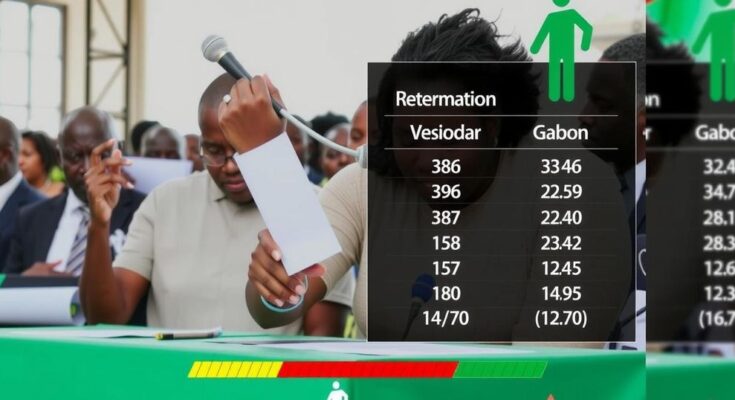Gabon’s military government announced that a vast majority of voters, 91.8%, approved a new constitution in a recent referendum. The proposed constitution includes measures limiting presidential terms and barring dynastic successions, while voter turnout was recorded at 53.54%. Supporters regard it as a step towards governance reform, whereas critics warn of dictatorial overtones. The referendum comes in the wake of a coup that removed long-time President Ali Bongo Ondimba, amid public calls for change.
Gabon’s military leadership has announced that the proposed new constitution has received significant support in a recent referendum, as reflected in provisional results disclosed on Sunday. Approximately 860,000 registered voters were encouraged through various media platforms to participate in this electoral process, casting either a green ballot for “yes” or a red ballot for “no”. According to the Committee for the Transition and Restoration of Institutions (CTRI), a remarkable 91.8 percent endorsed the new constitutional framework. The document outlines a presidential term limit of two consecutive seven-year terms, eliminates the role of prime minister, and precludes familial succession in leadership.
Despite the official campaign’s extensive promotion by the ruling junta, voter turnout has been reported at 53.54 percent, lower than the previously estimated 71 percent by state broadcaster Gabon TV. The electoral process was conducted without significant disruptions across 2,835 polling stations, which remained open until 6:00 PM. Amidst these elections, the junta has extended a night curfew to midnight to maintain order during the voting period.
The new constitutional proposals stipulate that presidential candidates must exclusively possess Gabonese nationality, with at least one parent born in Gabon and a spouse who is Gabonese. This stipulation effectively disqualifies Ali Bongo Ondimba, the former president who was ousted last year, as he is married to a French citizen. Transitional President Brice Oligui Nguema has hailed the referendum as a significant advancement while expressing his intention to return governance to civilian authorities within two years.
Prominent figures in opposition have criticized the new constitution, claiming it is designed to facilitate the emergence of a dictatorship. Marlene Fabienne Essola Efountame, a lawyer, asserted that, “We are creating a dictator who designs the constitution for himself.” Former President Bongo’s administration was marred by allegations of extensive corruption and ineffective governance, further heightening public discontent.
Despite skepticism regarding the legitimacy of the referendum, the interior ministry stated efforts had been taken to assure transparency, including the invitation of international observers. Recent survey results indicate robust public approval of Oligui, with many citizens concerned about jobs, healthcare, infrastructure, and living costs, underlining a demand for substantive change. The final adoption of the constitutional amendments will require ratification by the constitutional court.
The recent developments in Gabon stem from a significant political upheaval marked by a military coup that ousted President Ali Bongo Ondimba in August 2023. The military rulers have since promised a transition towards civilian governance and have introduced a new constitutional framework aimed at reshaping the political landscape in Gabon. With the referendum serving as a critical juncture for the nation’s future governance, the proposed constitution’s stipulations reflect ambitions to curb dynastic power transfer and enhance democratic structures. The political maneuvering surrounding this referendum has garnered intense scrutiny from both local and international observers.
The recent referendum in Gabon, with 91.8 percent approval for a new constitution, represents a pivotal moment in the country’s political evolution following a military coup. While the junta promotes this document as a pathway towards democratic governance, critics express concerns about potential autocratic tendencies inherent in its provisions. The outcome of this constitutional change reflects public hopes for reform, yet uncertainties about governance persist as the nation anticipates future elections.
Original Source: www.tiogapublishing.com




